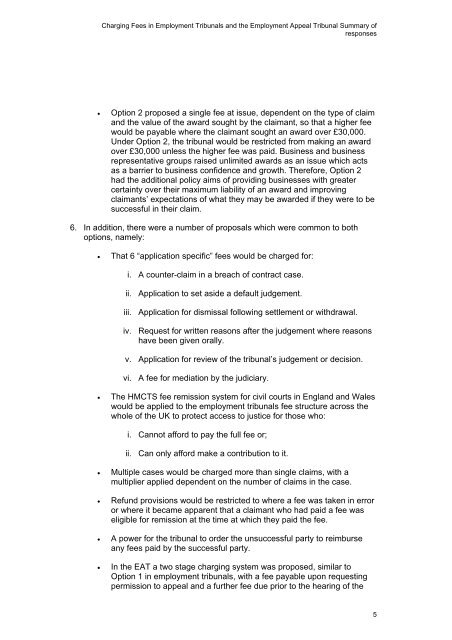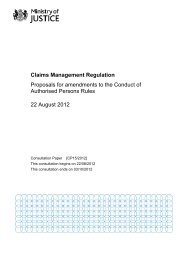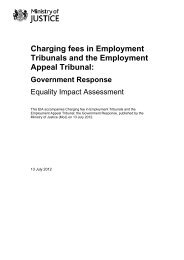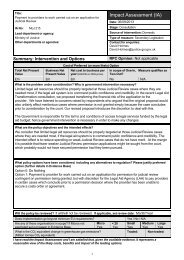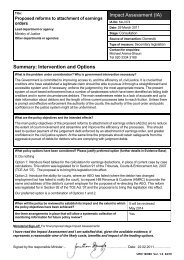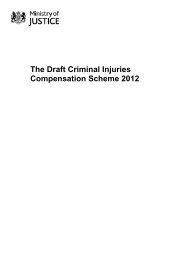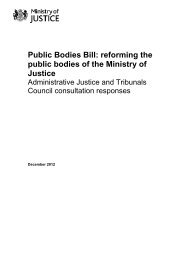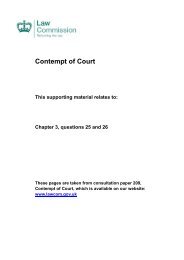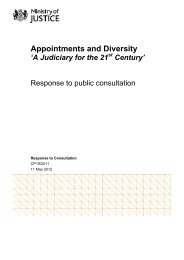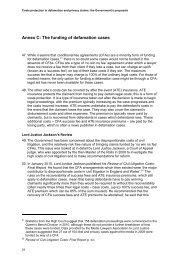Charging Fees in Employment Tribunals and the ... - Ministry of Justice
Charging Fees in Employment Tribunals and the ... - Ministry of Justice
Charging Fees in Employment Tribunals and the ... - Ministry of Justice
You also want an ePaper? Increase the reach of your titles
YUMPU automatically turns print PDFs into web optimized ePapers that Google loves.
<strong>Charg<strong>in</strong>g</strong> <strong>Fees</strong> <strong>in</strong> <strong>Employment</strong> <strong>Tribunals</strong> <strong>and</strong> <strong>the</strong> <strong>Employment</strong> Appeal Tribunal Summary <strong>of</strong>responsesOption 2 proposed a s<strong>in</strong>gle fee at issue, dependent on <strong>the</strong> type <strong>of</strong> claim<strong>and</strong> <strong>the</strong> value <strong>of</strong> <strong>the</strong> award sought by <strong>the</strong> claimant, so that a higher feewould be payable where <strong>the</strong> claimant sought an award over £30,000.Under Option 2, <strong>the</strong> tribunal would be restricted from mak<strong>in</strong>g an awardover £30,000 unless <strong>the</strong> higher fee was paid. Bus<strong>in</strong>ess <strong>and</strong> bus<strong>in</strong>essrepresentative groups raised unlimited awards as an issue which actsas a barrier to bus<strong>in</strong>ess confidence <strong>and</strong> growth. Therefore, Option 2had <strong>the</strong> additional policy aims <strong>of</strong> provid<strong>in</strong>g bus<strong>in</strong>esses with greatercerta<strong>in</strong>ty over <strong>the</strong>ir maximum liability <strong>of</strong> an award <strong>and</strong> improv<strong>in</strong>gclaimants’ expectations <strong>of</strong> what <strong>the</strong>y may be awarded if <strong>the</strong>y were to besuccessful <strong>in</strong> <strong>the</strong>ir claim.6. In addition, <strong>the</strong>re were a number <strong>of</strong> proposals which were common to bothoptions, namely:That 6 “application specific” fees would be charged for:i. A counter-claim <strong>in</strong> a breach <strong>of</strong> contract case.ii. Application to set aside a default judgement.iii. Application for dismissal follow<strong>in</strong>g settlement or withdrawal.iv. Request for written reasons after <strong>the</strong> judgement where reasonshave been given orally.v. Application for review <strong>of</strong> <strong>the</strong> tribunal’s judgement or decision.vi. A fee for mediation by <strong>the</strong> judiciary.The HMCTS fee remission system for civil courts <strong>in</strong> Engl<strong>and</strong> <strong>and</strong> Waleswould be applied to <strong>the</strong> employment tribunals fee structure across <strong>the</strong>whole <strong>of</strong> <strong>the</strong> UK to protect access to justice for those who:i. Cannot afford to pay <strong>the</strong> full fee or;ii. Can only afford make a contribution to it.Multiple cases would be charged more than s<strong>in</strong>gle claims, with amultiplier applied dependent on <strong>the</strong> number <strong>of</strong> claims <strong>in</strong> <strong>the</strong> case.Refund provisions would be restricted to where a fee was taken <strong>in</strong> erroror where it became apparent that a claimant who had paid a fee waseligible for remission at <strong>the</strong> time at which <strong>the</strong>y paid <strong>the</strong> fee.A power for <strong>the</strong> tribunal to order <strong>the</strong> unsuccessful party to reimburseany fees paid by <strong>the</strong> successful party.In <strong>the</strong> EAT a two stage charg<strong>in</strong>g system was proposed, similar toOption 1 <strong>in</strong> employment tribunals, with a fee payable upon request<strong>in</strong>gpermission to appeal <strong>and</strong> a fur<strong>the</strong>r fee due prior to <strong>the</strong> hear<strong>in</strong>g <strong>of</strong> <strong>the</strong>5


